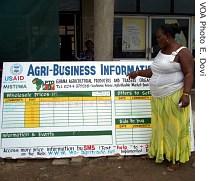2007年VOA标准英语-Text Messages Could Mean Money for African Farm(在线收听)
Dakar
10 May 2007
New technologies are starting to bring market information to African farmers straight to their cell phones, and these services are improving. But challenges remain in terms of illiteracy, market reach and expanding cell phone coverage. VOA's Nico Colombant has more from Dakar on one such product from Accra, Ghana.
 |
| BusyLab's Mark Davies, right, and the Tradenet Technicians |
This type of technology is being fine-tuned by a staff of West Africans and non-Africans working for a company called BusyLab in the Ghanaian capital.
British entrepreneur Mark Davies explains what market information is usually like in Africa.
"These information highways have traditionally been truck routes, transport routes, camel trains through the desert, sort of single corridors of transport, and information sort of just fall off these," he said.
That changes when a user gets information on his mobile phone.
"You can for the very first time in history get essentially real time information to help a farm know today what are the prices of the commodities in the market today," he added.
The idea is to get that information and make it available through text messages when requested.
Even though his service is only in its first year, Davies can already point to some interesting transactions.
"One of my partners watched somebody in Kaduna, in Nigeria, text in an offer to sell a product that he had, and within 30 minutes he had three telephone calls from traders in Lagos," he said. "And the deal was done in an hour. We have people in Rotterdam who are buying shear nuts from Mali. We have got people in Yemen that are buying organic fertilizer in Nigeria."
Back inside a noisy market in Accra, one happy customer was easy to find.
 |
| A vegetable seller Dorothy Quaye uses her cell phone to check current prices |
She adds that using a cell phone to improve her business came easily.
"Let us say I sell white maize. So I am in need of white maize. I just use my mobile phone that I have to send my message through my phone, that I am in need of white maize, then send the message," she explained. "Then for about five or some seconds I get the reply back from wherever the maize is, and even the price and even who to contact so before I am searching to go and buy the goods, everything is ready for me."
To expand this business model, an economics professor, Edward Kutsoati, says obviously, widespread illiteracy, will be a problem.
"Reading, writing, education is the key, is the bedrock for any economy, to move on from one level to the next," he said. "In the time being, it would be a constraint to the growth of this particular product. I have relatives back in the village that I wish I could send them text messages, but they are unable to read, they are unable to text message themselves and that would be a constraint."
But Davies says he has an idea for that problem.
"We are looking to set up traders of information, young people, comfortable with technology, helping farmers sell their produce or buy produce and that is the way we see this dissemination of information early on, through proxies and trade agents as we call them," he explained.
Other problems include a lack of mobile phone coverage in many parts of rural areas.
Kutsoati says the help of the public sector may be needed to improve that situation.
"The potential is there. It is really difficult to assess the risk," he added. "This is why maybe a public-private venture becomes very critical because it tends to share the risk between the private sector and public sector."
Other major challenges will be for more farmers to know about the product, and to guarantee the reliability of users.
Economists say turning cell phone beeps into money in the pockets of African farmers could be an economic miracle if it worked on a large scale, but well worth the effort.